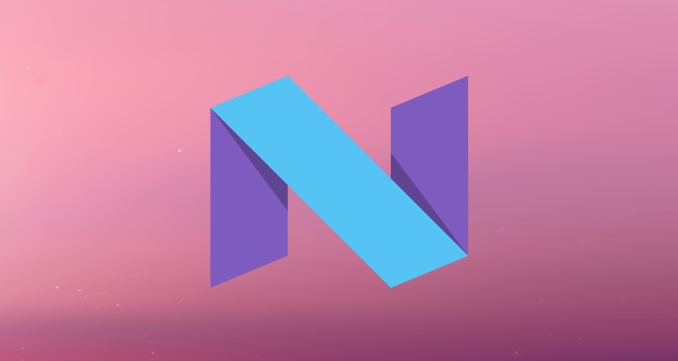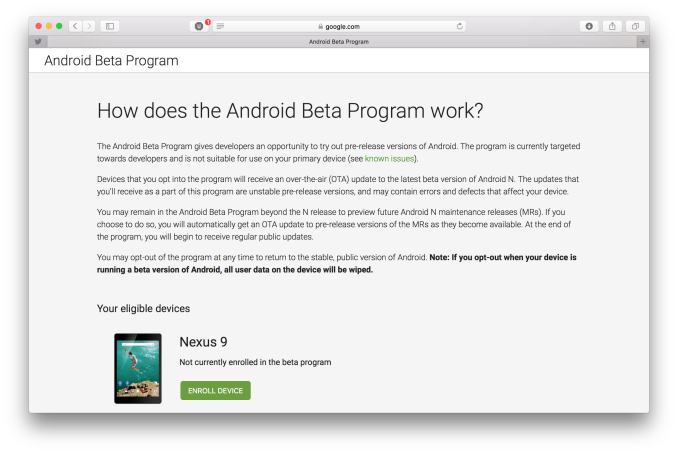Hands-On With the Android N Developer Beta: Multi-Window & More
by Brandon Chester on March 10, 2016 8:00 AM EST- Posted in
- Smartphones
- Android
- Mobile
- Tablets

Yesterday Google surprised a number of people by launching the developer beta of the next release of Android, which is codenamed Android N. Normally the beta version of Android comes to developers during Google I/O in May, but in a way it makes sense for Google to release it to developers a few months earlier so they can receive feedback and discuss common questions and concerns during the event.
The early release isn't the only change with this new beta version of Android. In the past I've often complained about Google's poor handling of developer betas. They've always been too monolithic for my liking, with only two or three betas being released to developers before the final version. There was also the problem with installation. While I am not averse to using the Unix shell, there is no reason that a developer should have to use adb via the command line to install a developer beta of Android. It should be done via an update directly from the device, or by some software tool with a proper graphical interface that can be run on your computer. It didn't help that the update packages often failed to work which required you to decompress it and flash each file one by one.
With Android N, Google has recognized and resolved these problems by providing a simple way for developers to opt in to the program via a web interface. Once you opt in, your device almost instantly receives a notification prompting you to install an over the air (OTA) update which will install the Android N beta. This is much more user friendly, and it has the added bonus of making it easier for users to opt in which gives Google more usage and diagnostic data to work with. Because the OTA isn't just making changes to the existing OS it is quite large, with it being just under 1GB on the Pixel C and Nexus 6, and 1.1GB on the Nexus 5X.
In this article I'll just be taking a look at some of the most notable features of Android N, including Multi-Window mode, changes to notifications, and improvements to energy and memory optimizations.











124 Comments
View All Comments
BenSkywalker - Friday, March 11, 2016 - link
Tablets sold over 200 million units globally in 2015- wherever you got your numbers, they aren't even close.https://www.idc.com/getdoc.jsp?containerId=prUS409...
michael2k - Friday, March 11, 2016 - link
I was looking at a quarterly report by Gartner, which will show seasonal variance not seen in an annual report. The Gartner report was also focused on tablet-hybrids and detachable PCs (they call them ultramobile PCs), which is a smaller subset of the tablet space. I thought that relevant because I was comparing PCs to tablets that would replace PCs.lilmoe - Thursday, March 10, 2016 - link
Windows tablets *will* dominate. It's just a matter of time.michael2k - Friday, March 11, 2016 - link
I wouldn't bet either way. They certainly didn't defeat Android, iOS, nor BB before dwindling to its current state in phones!Hyper72 - Saturday, March 12, 2016 - link
Ah yes, I remember people saying that about Microsoft Pocket PC in 2000, then Windows Mobile, then MS Smartphone later, etc. etc.Markets can and do change ofcourse, it could happen. Having said that I like both Android and iOS, I use both and have versions of the same apps on them. However Windows on tablets is still an uncomfortable hybrid, just like Windows 10 on my PC have both a classic and a modern control panel with different settings.
raptormissle - Saturday, March 12, 2016 - link
They said the same about windows phone and look where that is now. All of the new apps come out on Android and iOS. Windows isn't even a factor and never will be.trane - Thursday, March 10, 2016 - link
Meh, the multitasking is not up to scratch with Windows 10, or even 8.1. Microsoft has really nailed it with the arbitrary scaling, UWP apps scale wonderfully no matter what you do with them. Even desktop apps usually play well in tablet mode.raptormissle - Thursday, March 10, 2016 - link
Yeah, lets compare a desktop OS to a mobile OS. Microsoft never nailed anything besides being the worlds largest vector for viruses, malware and ransomware.lilmoe - Thursday, March 10, 2016 - link
The good part about it is how people like you get angry at how Microsoft is doing a much better job making a "desktop OS" do tablet stuff better than any other "tablet OS", and more fluidly and intuitively so...I've installed Windows 10 on an Atom based Acer tablet with 2GB of RAM and 32GB of MMC storage. I was astonished on how much more fluid and responsive the *full version* of Windows 10 runs on hardware far less superior than last years iOS and Android tablets. Battery life was stellar. It's not even a comparison. Tablet Mode takes the tablet experience to a whole new level.
Oh, and Windows 10 won't be suffering from planned obsolescence. If the latest RS1 Insider build is any indication, it's just going to get faster with each major update.
Again, don't worry, Windows 10 dominating tablets is just a matter of time.
raptormissle - Thursday, March 10, 2016 - link
I like it when Windows people feel threatened about Android. It brings out their true character. It must be hard for Microsoft to come to grips that the OS they once sold and made billions from is now a commodity OS. Android sure pulled the rug out from under them. But, then what would you expect from a company that didn't even see the Internet coming. And now they're scrambling to give their products away and put them on any platform they can just to stay relevant. Microsoft is a has been and the lack of developer support for their platform is just another nail in their coffin. Those idiots once marched around carrying an iPhone coffin when they heralded the arrival of Windows phone. Little did they know it was their own coffin they were carrying.Windows tablets are good for nothing but running old windows apps on.